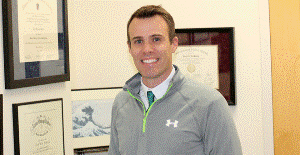Researchers at UMass Medical School are working on ways to remotely and noninvasively monitor patients with serious cardiac disease in the hopes of keeping them healthier and preventing emergency room visits and hospitalizations.
 David McManus, MD, Is part of a research team that is developing and testing wearable devices capable of monitoring heart patients for disease-related complications.
David McManus, MD, Is part of a research team that is developing and testing wearable devices capable of monitoring heart patients for disease-related complications.
David McManus, MD, associate professor of medicine in the Division of Cardiovascular Medicine and associate professor of quantitative health sciences, along with colleagues from the Massachusetts Institute of Technology, Northeastern University and the University of Connecticut School of Engineering, are developing and testing wearable devices capable of monitoring heart patients for disease-related complications. The research is funded by a grant from the National Science Foundation’s Smart and Connected Health Program.
The researchers are developing a vest that can detect subclinical cardiac dysfunction and a smart watch that will assess for rhythm abnormalities that can be life threatening. The observational study will collect data from patients who wear the devices to develop computer programs to analyze the data and, eventually, assist in identifying at-risk patients.
According to Dr. McManus, the ultimate goal of such devices is to allow seriously ill cardiac patients to remain in their homes and to provide them (and their physicians) with timely information that allows them to seek treatment well in advance of a serious complication of heart disease.
McManus, who is also an adjunct professor at Worcester Polytechnic Institute, has collaborated on numerous research projects funded by the NIH, the Department of Defense and industry (Philips Home Healthcare) for developing and testing wearable health monitoring devices, including sensors and computer-assisted algorithms for assessing cardiac dysfunction and blood loss; wearable garments for detecting heart failure decompensation; and smartphone/watch apps for monitoring for heart rhythm abnormalities. He has an ongoing project in collaboration the UMass Medical School Office of Global Health leveraging two mHealth devices for arrhythmia monitoring in rural India.